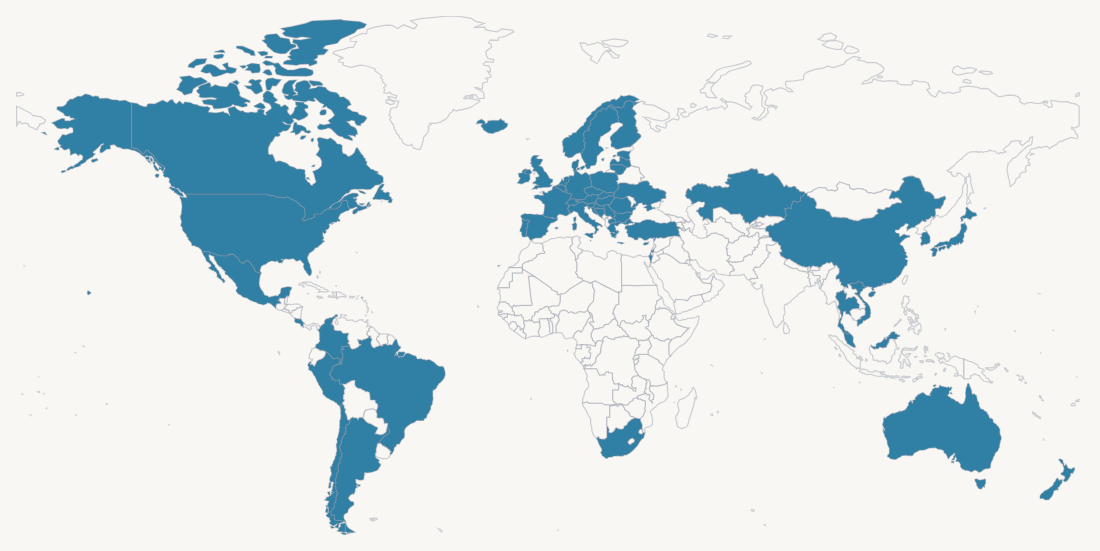

Prepared by Andrés Barreneche, OECD
Last update: 17 October, 2023
This online report describes the data collected in the 2023 edition of the EC-OECD Science, Technology and Innovation Policy (STIP) survey. The STIP Survey systematically collects in a harmonised way qualitative data on national science, technology and innovation (STI) policies. It addresses all areas of STI policy, including initiatives spread across different ministries and national agencies, with competence over domains as broad as research, innovation, education, industry, environment, labour, finance/budget, among others.
The 2023 edition of the survey was administered between February and April 2023. The survey included 57 questions covering all main aspects of the (national) innovation system, structured around six “core” policy areas: (i) Governance, (ii) Public research system, (iii) Innovation in firms and innovative entrepreneurship, (iv) Knowledge exchange and co-creation, (v) Human resources for research and innovation, and (vi) Research and innovation for society. It also includes one edition-specific “module” on Net zero transitions with six questions.
Most questions in the survey ask respondents to provide information on relevant STI “policy initiatives”. Drawing partly on an EC definition, an STI policy initiative can be defined as a public action that (i) aims to achieve one or several public policy goals in the policy area of science, technology and innovation, (ii) is expected to modify or frame the behaviours of actors and stakeholders, being national, domestic or foreign, who are part of or influential on, the national innovation system, and (iii) is implemented with a minimum time horizon or on a continuous basis (i.e. not as a one-off “event”). More information on the data model used to structure STIP Compass is available in a reference document (PDF) and in machine readable format.
The survey is answered by government officials every two years, with coordination carried out by national delegates of the OECD’s Committee for Scientific and Technological Policy (CSTP) and the EC’s European Research Area Committee (ERAC). The 2023 edition of the STIP Survey gathered information on about 7,700 policy initiatives from 57 countries and 6 entities, i.e. 5 administrative authorities in Belgium (submitting separate responses), and the European Union (EU). Figure 1 shows the territorial coverage of the survey.
Figure 1. Coverage of the 2023 edition of the EC-OECD STIP Survey

The quality of the data gathered by the EC-OECD STIP survey has improve markedly over the years. In the 2017 edition of the survey, only 53% included information on estimated yearly budget expenditures. In the 2023 edition of the survey, this share increased to 74%. The level of reporting has also increased, as the country median number of policy initiatives increased from 81 in the 2017 edition to 113 in the 2023 edition.
It is important to note that the data consists of self-reported descriptions provided by survey respondents. To harmonise the database, the EC and OECD not only provide detailed guidance for answering the survey but also curate the information that has been reported. However, data quality varies by country. In particular, some countries have provided more complete and detailed information compared to others. Country-specific scorecards provide different quality benchmarks of the current level of reporting in the database for each country. They include charts describing the country’s number of initiatives and the types of missing information that compare against the median country participating in the database. They are useful points of reference to identify gaps in the information that has been reported. The scorecards and complementary information on the data collection process are available in the STIP Survey resource centre. Care should also be exercised when interpreting the data as initiatives vary in scope and scale, imposing limitations to how aggregations of initiatives can be interpreted.
This report is based on a curated version of the 2023 STIP survey data (available for download here). The analysis is broken down by sections, corresponding to each of the survey's policy areas. They can be accessed using the links below. Each of these sections includes a synthesis of national policy debates (powered by GPT-4) and a descriptive analysis of policy initiatives reported by countries.